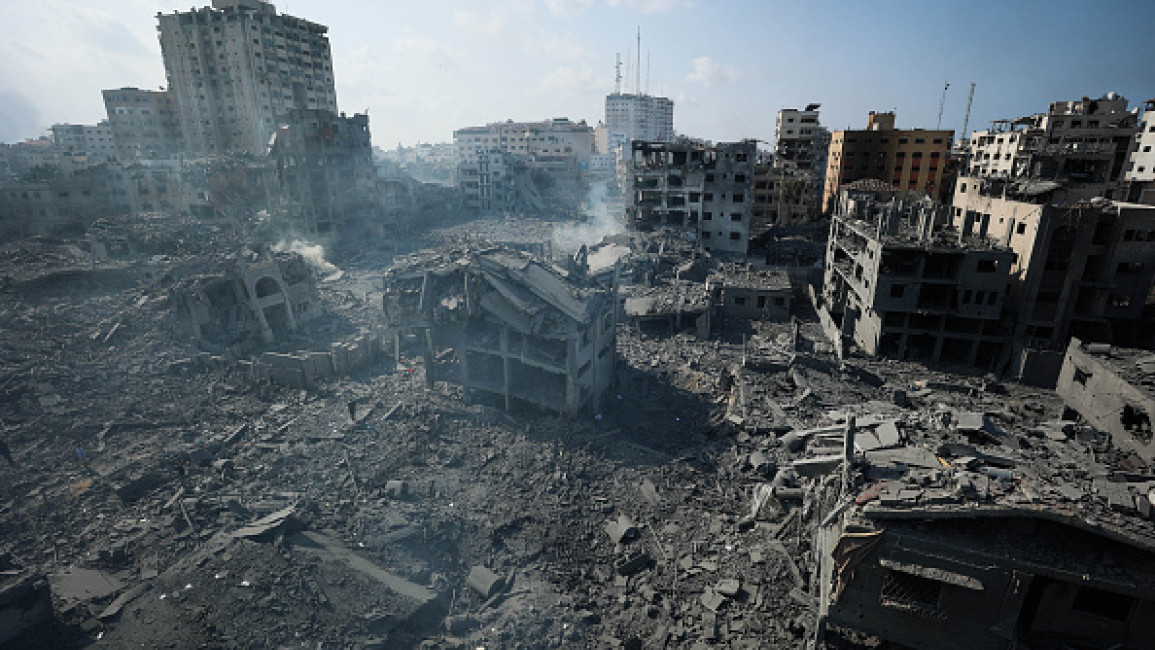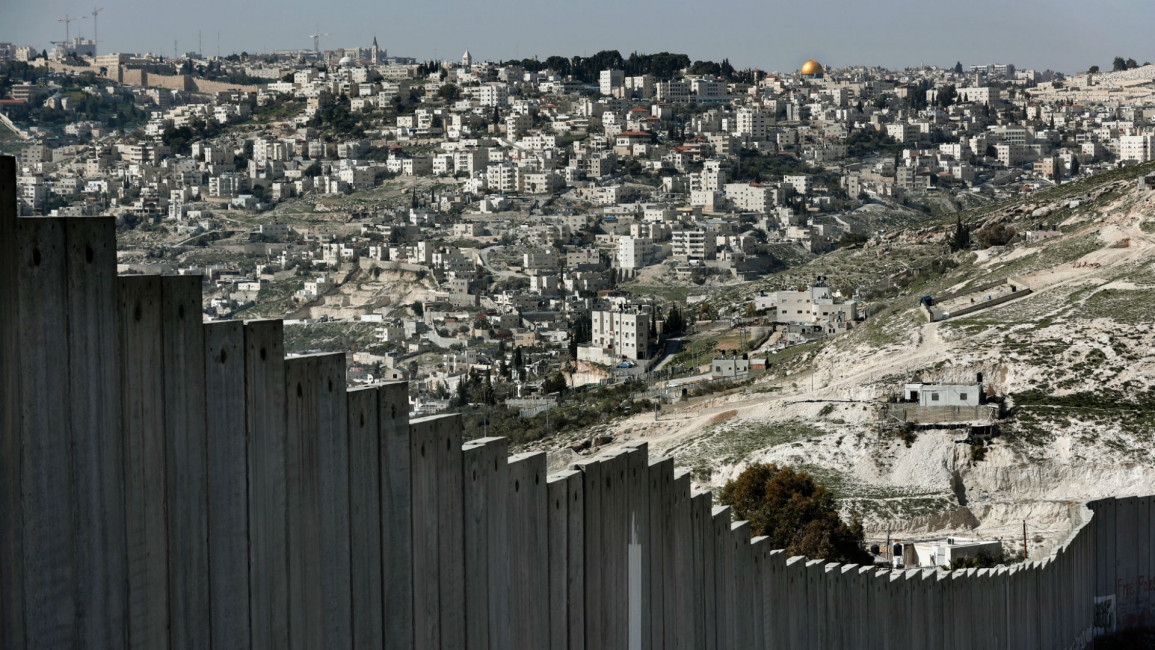
Does Israel have an endgame in Gaza?

As Israeli and Palestinian civilians find themselves trapped in another cycle of death and destruction, returning Gaza to the unsustainable status quo that existed before this latest escalation is not a viable solution.
There can and should be no going back to how things were before - even with Mahmoud Abbas and his Palestinian Authority (PA) at the helm.
In the wake of Hamas’ bloody attack, Israel’s government has vowed to eradicate the group. So far it is Gaza that has borne the brunt.
Over 2,600 Palestinians have been killed and 1 million internally displaced in a week of destructive Israeli airstrikes. Israel’s army is now massing for a ground invasion. It will be a bloody fight with an uncertain outcome.
"Even if Israel does succeed in uprooting Hamas from Gaza, strategic victory will prove elusive. Hamas will remain a potent political and military force, with a significant presence in the West Bank and Lebanon"
Even with one of the most advanced armies in the world, Israel will struggle against well-prepared and determined defenders who will use the densely packed urban landscape to their advantage.
Hundreds, if not thousands, more Palestinian civilians will die. Gaza’s civilian infrastructure will be destroyed. Many Israeli soldiers will likely also be killed in protracted fighting even as Hamas continues its attacks on population centres within Israel - which have so far claimed 1,400 Israeli lives.
Even if Israel does succeed in uprooting Hamas from Gaza, strategic victory will prove elusive. Hamas will remain a potent political and military force, with a significant presence in the West Bank and Lebanon - from where it could continue to carry out attacks in partnership with other armed groups.
Meanwhile, Israel will find itself in control of a Gaza Strip broken and in ruins, mired in an even deeper humanitarian crisis that will foster the conditions for greater extremism. And Israel will have no clear exit strategy.
As it has done in the occupied West Bank, Israel will look to the international community to foot the bill for its occupation and relieve it of the financial burden of rehabilitating Gaza.
It may also turn to the PA led by President Mahmoud Abbas to avoid having to administer Gazans itself as was the case prior to the 1993 Oslo Accords. But the PA is in a precarious position due in part to Israel’s own actions.
Successive Israeli governments have spent much effort undermining it: by expanding settlements and eroding any political horizon for achieving a two-state solution; increasing deadly military raids into the heart of Palestinian-controlled cities; and worsening the PA’s budgetary crisis by confiscating its tax revenues.
|
|
Over the years, Israel has also sought to deepen political and socio-economic divisions between the West Bank and Gaza with the aim of fracturing the Palestinian national movement and preventing the emergence of a viable Palestinian state.
Palestinian leaders also have themselves to blame. Hamas and Fatah have long been at loggerheads. Since kicking out Fatah-controlled PA security forces in 2007, continued bickering has scuppered repeated reconciliation talks.
By cancelling national elections in 2021 – which would have been the first since 2006 - Abbas also missed an opportunity to bind Hamas to a more moderate political track and revive the PA’s dwindling legitimacy amongst the Palestinian public.
Since then, the PA has lost effective control over West Bank refugee camps where armed groups are resurgent - many with links to Abbas’ own Fatah party. A majority of Palestinians now consider the PA a burden on their national liberation movement and are angered by its ongoing security cooperation with Israel to clamp down on Palestinian resistance.
"Even if the Palestinian Authority did return to Gaza in the tracks of Israeli tanks, it is unlikely to be able to maintain security control without a continued Israeli military presence there"
In such a difficult context, it is unclear whether Abbas would be prepared to play such an obvious role subcontracting for Israel in Gaza. This would further erode whatever domestic standing the PA has left and lumber it with the severe socio-economic challenges caused by Israeli actions.
The offer of substantial increases in foreign funding and renewed international patronage may sweeten the deal. But even if the PA did return to Gaza in the tracks of Israeli tanks, it is unlikely to be able to maintain security control without a continued Israeli military presence there.
The PA will likely also have to contend with Israel’s desire to maintain tight restrictions on Gaza’s borders in an effort to stop Hamas from re-arming and maintain its socio-economic separation from the West Bank.
Israel may well try to import its West Bank model to Gaza – by having the PA administer Palestinians under open-ended Israeli military control. But as Gaza’s long history of resistance against Israeli occupation shows, this will drive more political instability and insecurity to come.
Over the long term, Israel’s return to Gaza would further trap Israelis and Palestinians in a deepening one-state reality of open-ended conflict and apartheid.
This dire situation will play into the hands of the settler movement and its vision of a Greater Israel encompassing Palestinian territory. Its members have called for re-establishing settlements in Gaza since these were dismantled following Israel unilateral disengagement in 2005.
Hard-right Israeli figures in the ruling coalition may also see an opportunity to uproot a significant part of Gaza’s population.
|
|
The United States has reportedly sought to enlist the support of Arab Gulf states to wave Egyptian debt in return for Cairo accepting an influx of Palestinian refugees. But Gazans will be deeply reluctant to seek refuge across the border.
Many are already refugees whose families fled present-day Israel during its establishment in 1948 and were subsequently denied the right to return to their homes – in what Palestinians call their Nakba (national catastrophe). Fearing that history may repeat itself, Gaza’s inhabitants are unlikely to willingly leave for Egypt.
Displacing hundreds of thousands of Palestinians into the Egyptian Sinai would create a whole new set of humanitarian and security risks. Egypt lacks the local infrastructure to support such a large population over the long term.
"Over the long term, Israel's return to Gaza would further trap Israelis and Palestinians in a deepening one-state reality of open-ended conflict and apartheid"
Faced with what would likely be a bleak and desolate future, many Palestinians could be expected to gamble on a dangerous sea crossing to Europe. Others may join armed groups attacking Israeli targets in Gaza and across Israel’s 200km desert border with Egypt.
By now it should be apparent that military force will not provide a long-term solution. A sustainable and dignified future for Gaza will require an ending of Israel’s siege and its political reconnection to the West Bank.
But there will be no quick or easy political track, absent a sea-change in Israeli attitudes and deep-rooted reform of the Palestinian national movement.
Ultimately, long-term peace and security for both sides can only come through an end to Israel’s occupation and the fulfilment of Palestinian self-determination.
The international community must seize the moment afforded by this mounting tragedy to launch a serious diplomatic push to achieve these goals and finally end decades of bloodshed.
Hugh Lovatt is a policy fellow with the Middle East and North Africa program at the European Council on Foreign Relations based in London
Follow him on Twitter: @h_lovatt




